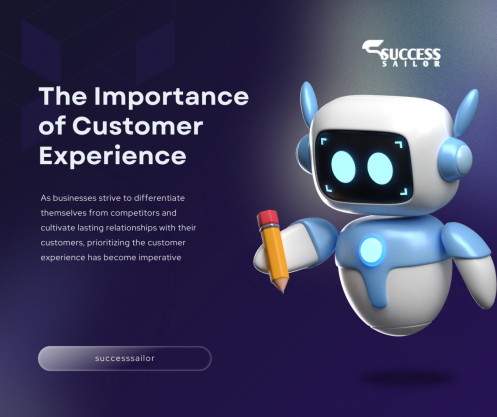The Importance of Customer Experience in Today’s Business World

- Introduction to Customer Experience
- Defining customer experience
- Importance of customer experience in business
- Key Elements of Customer Experience
- Personalization
- Convenience
- Customer support
- Feedback and improvement
- Impact of Customer Experience on Business Success
- Increased customer loyalty
- Positive word-of-mouth
- Higher revenue
- Customer Experience Trends in Today’s Business World
- Digital transformation
- Omnichannel experience
- AI and machine learning
- Strategies for Enhancing Customer Experience
- Data-driven insights
- Employee training
- Continuous improvement
- Conclusion
- Recap of the importance of customer experience
- Call to action for businesses
The Importance of Customer Experience in Today’s Business World
In today’s hyper-competitive business landscape, the importance of customer experience cannot be overstated. As businesses strive to differentiate themselves from competitors and cultivate lasting relationships with their customers, prioritizing the customer experience has become imperative.
Defining Customer Experience
Customer experience encompasses every interaction a customer has with a company, from initial awareness to post-purchase support. It involves the sum of all experiences, perceptions, and emotions that a customer undergoes throughout their journey with a brand.
Importance of Customer Experience in Business
The significance of customer experience lies in its ability to influence customer satisfaction, loyalty, and advocacy. A positive experience fosters trust and loyalty, encouraging customers to return and recommend the brand to others. In contrast, a poor experience can lead to dissatisfaction, churn, and negative word-of-mouth.
Key Elements of Customer Experience
Several key elements contribute to a remarkable customer experience:
Personalization: Tailoring products, services, and interactions to meet the unique needs and preferences of individual customers enhances their sense of value and belonging.
Convenience: Streamlining processes, reducing friction points, and providing seamless experiences across channels make it easier for customers to engage with the brand.
Customer Support: Prompt and effective resolution of inquiries, issues, and concerns demonstrates care and commitment to customer satisfaction.
Feedback and Improvement: Actively soliciting feedback and using it to iterate and improve products, services, and processes demonstrates responsiveness and dedication to continuous enhancement.
Impact of Customer Experience on Business Success
Investing in customer experience yields tangible benefits for businesses:
Increased Customer Loyalty: Satisfied customers are more likely to remain loyal to the brand, leading to repeat purchases and long-term relationships.
Positive Word-of-Mouth: Delighted customers become brand advocates, sharing their positive experiences with friends, family, and social networks, amplifying the brand’s reach and credibility.
Higher Revenue: Customer-centric businesses tend to outperform competitors, enjoying higher revenue and profitability due to increased customer retention and acquisition.
Customer Experience Trends in Today’s Business World
As technology evolves and consumer expectations evolve, several trends are shaping the landscape of customer experience:
Digital Transformation: Embracing digital channels and technologies to deliver personalized, seamless, and convenient experiences across online and offline touchpoints.
Omnichannel Experience: Integrating multiple channels and platforms to provide customers with a cohesive and consistent experience regardless of how they choose to interact with the brand.
AI and Machine Learning: Leveraging artificial intelligence and machine learning algorithms to analyze data, predict customer behavior, and deliver hyper-personalized experiences at scale.
Strategies for Enhancing Customer Experience
To excel in customer experience, businesses can adopt the following strategies:
Data-Driven Insights: Harnessing customer data to gain actionable insights into preferences, behaviors, and pain points, enabling more informed decision-making and targeted interventions.
Employee Training: Empowering frontline staff with the knowledge, skills, and tools to deliver exceptional service and resolve customer issues effectively, thereby enhancing overall satisfaction and loyalty.
Continuous Improvement: Cultivating a culture of innovation and agility, where feedback is embraced as an opportunity for learning and growth, and iterative improvements are made to enhance the customer experience continuously.
Conclusion
In conclusion, the importance of customer experience in today’s business world cannot be overstated. By prioritizing personalized, convenient, and supportive experiences, businesses can foster loyalty, advocacy, and sustainable growth in an increasingly competitive landscape.
5 Unique FAQs
- Why is customer experience important for businesses?Customer experience directly impacts customer satisfaction, loyalty, and advocacy, driving revenue and growth.
- How can businesses improve customer experience?Businesses can enhance customer experience by personalizing interactions, streamlining processes, providing excellent customer support, and continuously seeking feedback for improvement.
- What role does technology play in customer experience?Technology enables businesses to deliver personalized, seamless, and scalable experiences through digital channels, AI, and machine learning.
- What are the risks of ignoring customer experience?Ignoring customer experience can lead to customer dissatisfaction, churn, negative word-of-mouth, and ultimately, loss of revenue and market share.
- How can small businesses compete in customer experience with larger competitors?Small businesses can differentiate themselves by focusing on niche markets, leveraging their agility to adapt quickly, and delivering personalized, high-touch experiences that larger competitors may struggle to replicate.




